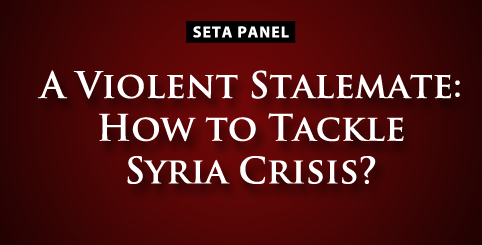There is only one answer to give to the question as to what changed after the Annan Plan took effect in Syria: the Baathist massacres that already claimed thousands of lives are now called “violations of the Annan Plan.” The Baath regime killed before and it continues to kill, but now the international media has a new name for the massacres, “violations of the peace plan.”
The Annan Plan was a miracle plan that could have benefited, in the short term, all those who were not disturbed by the bloodshed. It transformed Russia from being the number one sponsor of the Baathist massacres to a force working towards the effective fulfillment of the peace plan. On the eve of elections, it gave the United States, in the face of the ongoing massacres, the gift of an excuse that could be stretched out for months: “Let the Annan process play out first.” It also provided the perfect opportunity for Iran to gain time with the joke of a claim “let there be a dialog between the regime and the opposition.” The Arab League was already congratulating itself for creating a cushy political opportunity of absolving itself from responsibility by becoming a part of the Annan plan.
The al-Assad regime perceived the Annan Plan as a savior amidst all the actors that could potentially intervene had they not been so preoccupied by their 2012 concerns. The regime accepted the plan at once, just like it accepted all offers previously extended by Turkey or the Arab League. After all, the Baath regime does not have a problem with accepting. Its problem lies in making good on all the promises made by the acceptance of the plans. The Syrian regime perceives the Annan Plan as a mechanism that will mask all the massacres it commits in the future. This is because any massacre committed from now on will not be taking place on the legal ground of its own dictatorship, but on the ground created by the Annan plan.
The Syrian uprisings and the massacres that took place, this tragedy of humanity cannot be left to the meaningless political maneuvers and initiatives of a retired UN bureaucrat. There is no compelling reason to take this plan seriously. It has no calendar or enforcement, and was devised by a retired bureaucrat who thought of visiting countries that blatantly support the al-Assad regime before putting the plan into effect, but could not even think of visiting Turkey. That the Annan plan solicits support from all involved by the nature of its content does not make it an applicable plan.
Today, in Syria, all that happened before the Annan Plan continues to happen. The only thing achieved by pretending that a de facto, meaningless plan is effective or could be effective is room for more bloodshed. In fact, Mr. Annan declares, almost weekly, the meaninglessness of his duty by listing the violations of the plan he represents. It is about high time that this vicious cycle was stopped. This retired bureaucrat must be relieved of his duty at once, if he is to be absolved from the responsibility of the continuing bloodshed and saved from the meaningless hole he found himself in. It is impossible for any plan without a proper enforcement mechanism to stop the Baath regime.![]()







